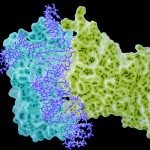Lien vers Pubmed [PMID] – 30382169
Sci Rep 2018 Oct;8(1):16126
Characterizing a protein mutational landscape is a very challenging problem in Biology. Many disease-associated mutations do not seem to produce any effect on the global shape nor motions of the protein. Here, we use relatively short all-atom biomolecular simulations to predict mutational outcomes and we quantitatively assess the predictions on several hundreds of mutants. We perform simulations of the wild type and 175 mutants of PSD95’s third PDZ domain in complex with its cognate ligand. By recording residue displacements correlations and interactions, we identify “communication pathways” and quantify them to predict the severity of the mutations. Moreover, we show that by exploiting simulations of the wild type, one can detect 80% of the positions highly sensitive to mutations with a precision of 89%. Importantly, our analysis describes the role of these positions in the inter-residue communication and dynamical architecture of the complex. We assess our approach on three different systems using data from deep mutational scanning experiments and high-throughput exome sequencing. We refer to our analysis as “infostery”, from “info” – information – and “steric” – arrangement of residues in space. We provide a fully automated tool, COMMA2 ( www.lcqb.upmc.fr/COMMA2 ), that can be used to guide medicinal research by selecting important positions/mutations.

